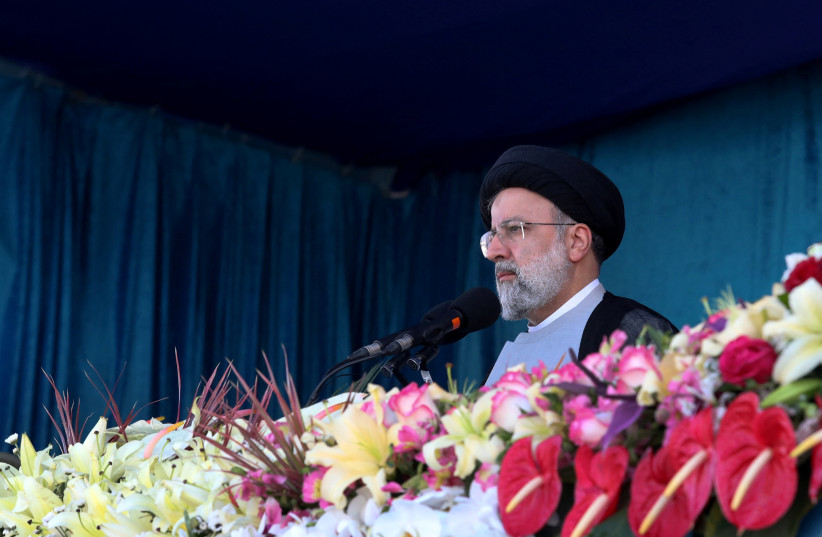Iranian President Ebrahim Raisi gave a speech on Monday in which he covered a variety of topics.
He said he did not plan to meet US President Joe Biden during an upcoming trip to the UN General Assembly. This comes as talks on the Iran nuclear deal continue in Europe and as rumors percolate in Washington that America will return to the agreement. Raisi also slammed “Zionist threats,” asserting that Iran had the ability to confront Israel.
"Zionist threats" against nuclear scientists
The Iranian leader said Israel was an “arrogant” regime and that Iran had a right to have a nuclear industry.
“We have repeatedly stated that nuclear weapons have no place in the doctrine of the Islamic Republic,” he said, claiming that Iran was not pursuing them.
He did say, however, that the current nuclear industry in his country is the result of indigenous scientific success and cannot be taken from it.

“Iran’s nuclear industry is needed and used in agriculture, oil and gas, medicine and many other industries,” he said. “From the beginning, the Zionist regime did not want Iran to have access to this knowledge. But today, against their will and arrogance, this knowledge has become indigenous and cannot be taken from Iran.”
Raisi discussed the “assassination of nuclear scientists” in this respect.
“Iran was not stopped by these actions and seditions, and no action by the Zionist regime will stop us from taking this right.”
“Iran was not stopped by these actions and seditions, and no action by the Zionist regime will stop us from taking this right.”
Iranian President Ebrahim Raisi
He mentioned the “resistance” in Gaza, an apparent reference to the recent conflict between Israel and Palestinian Islamic Jihad. He also referenced Qasem Soleimani and other pro-Iranian actors in the region.
He then said, “If the Zionist regime takes a decision against Iran, it has no deadline to act.” This sentence lacked clarity in the context of his overall discussion. It apparently hinted that Iran was waiting for the right place and time to respond to Israel for past actions by the Jewish state against the Islamic Republic.
The Islamic revolution continues
The speech did not begin with any fireworks, but was a long, mundane talk about the importance of “institutions” for Iran and the “Islamic Revolution.” Raisi provided a number of insights into his government’s attempts to improve the lives of the people.
“In the last one year, trips were made to 31 provinces of the country and more than 50 cities and villages.”
HE STRESSED the importance for officials not to “sit behind a desk” but to be active in their areas.
“It has always been emphasized to the statesmen that they should have this view of the people,” he said. “The fact that people had a drug problem and we don’t see closely that they have a drug problem means [something]... should be done. It is not enough just to be present among the people; knowing their problem and finding a solution to solve the problem and following the solution of the problem are all three points of interest.”
Raisi discussed Iran’s recent budget, clearly showing a preference for domestic concerns. The current government has sought closer ties with Russia and China. This comes in the context of not wanting to waste time working with the West.
Tehran believes it can get around sanctions and improve its economy via Moscow and Beijing. As such, the government also wants to root out corruption and shift resources to the countryside.
“No manager in the country is defined without supervision and control,” the Iranian leader said. “That is, in addition to his management work, he has the responsibility of fighting corruption first, and then the relevant institutions outside that organization and outside the government [will be] in charge.”
Raisi then turned to the importance of “jihad” and the “Islamic Revolution. We should seek to solve problems with a spirit of jihad [violent uprising],” he said, adding that a religiously zealous struggle that is also internal could help the country.
He expressed an economist’s desire to tame inflation and a fundamentalist’s insistence that women cover themselves in public.
“We should seek to solve problems with a spirit of jihad.”
Iranian President Ebrahim Raisi
“The life of women in this country has been associated with purity, chastity, and hijab,” he said. Iran is one of the only states in the world that sends “religious police” to harass women for how they dress.
Iran's regional interests
He then touched on the security interests of Iran in the region, such as its role in the Shanghai Cooperation Organization and the development of Iran-China relations.
“Our presence in the region is a security-building presence,” he said. “To the extent that the presence of the Islamic Republic of Iran in the region has been able to create security in the region, our economic role is not [developed] to that extent, and we must do this for economic and commercial work, which is one of the fields and platforms that can be very effective for the relations of the Islamic Republic of Iran. It is a matter of cooperation with our friend China.”
Raisi said he wants more development in ties with China. Iran is currently implementing a 25-year plan with China, he said, hinting that any new work Tehran was doing with the West would not interfere with Chinese diplomatic ties.
“This is a completely independent relationship between the Islamic Republic of Iran and China, which exists in various fields, especially the commercial and economic fields between the two countries, and it should be developed,” Raisi said. The two countries, he added, “are determined to develop this relationship.”
